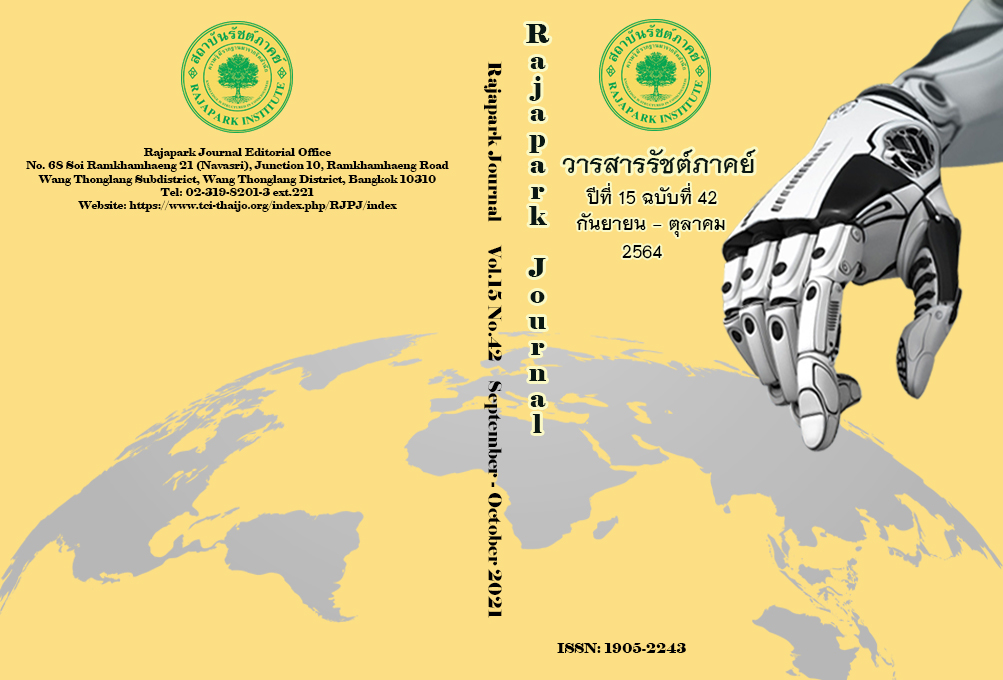Development of Learning Management Model for Enhancing the Media Production Skills
Main Article Content
Abstract
The objectives of this study were 1) to synthesize a learning management model 2) to develop a learning management system for enhancing media production skills and 3) to investigate the use of the developed model. Research and Development. The samples were 38 second-year undergraduate students in Agricultural Education, Faculty of Industrial Education and Technology, King Mongkut's Institute of Technology Ladkrabang, who were enrolled in the course of Media, Innovation, and Information Technology in Education, semester 2, the academic year 2020, selected by using a purposive sampling method. The data was analyzed by using mean, standard deviation, percentage, and t-test statistics. The results showed that 1) the developed model consisted of Action, Active, Application, and Assessment (4A). The model was evaluated by experts at a high level, 2) the learning management was at the highest level, and 3) the results of model implementation indicated the post-study mean score was higher than the pre-study mean score at a significant level of .01, the results of students’ media production were evaluated and indicated that the mean score was 34.63, which was 76.96%. The satisfaction of learners was at a high level. The efficiency of the developed model was 82.93/81.14%, which was higher than the 80/80 criterion. The developed 4A model of learning management could enhance achievement and media production skills.
Article Details
Views and opinions appearing in the Journal it is the responsibility of the author of the article, and does not constitute the view and responsibility of the editorial team.
References
Amornvivat, S. (1990). “Sombatthip” of Thai Education (Sombatthip khong kansuksa Thai). Bangkok: Chulalongkorn University.
Chaicharoen, S. (2002). Teaching design theory in a new paradigm. Khon Kaen: Faculty of Education, Khon Kaen University.
Joyce, B., Weil, M., & Calhoun, E. (2004). Model of Teaching (7th ed.). Boston: Allyn and Bacon.
Kanjanawasee, S. (2011). Assessment Theory (8th ed.). Bangkok: Chulalongkorn University Press.
Kengthong, C. (2011). Lecture Documents on Teaching Materials. Bangkok: King Mongkut's Institute of Technology North Bangkok.
Khamanee, T. (2002). A Variety of Alternative Teaching Styles. Bangkok: Chulalongkorn University.
Malithong, K. (2000). Educational Technology and Innovation (2nd ed.). Bangkok: Faculty of Education, Chulalongkorn University.
Office of the Education Council. (2018). National Education Standards 2018. Retrieved January 15, 2019. from https://eduservice.yru.ac.th/newweb/files/mua/1651-file.pdf
Phatthiyathanee, S. (2010). Measurement of Educational Results. Mahasarakham: Faculty of Education,
Mahasarakham University.
Ruangsuwan, C. (1990). Educational Technology. Bangkok: Odeon Store.
Srisamrit, K. (2015). Development of Audio Production Skills Training Model in Line with Connectivism Theory(Doctor of Philosophy). King Mongkut’s University of Technology North Bangkok.
Thadang, N. et al. (2002). Educational Technology for Learning. Teacher Training Series: Gathering Information. Bangkok: Office of Education Reform.
Thongying, C. (2016). Teacher Problems: Problems Pending Reform. Retrieved January 17, 2019, from https://library2.parliament.go.th/ebook/content-issue/2559/hi2559-091.pdf
Yamkasikorn, M. (1983). Using Technology in the Classroom. Songkhla: Srinakharinwirot University, Songkhla Campus.


